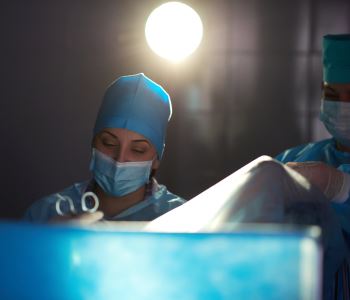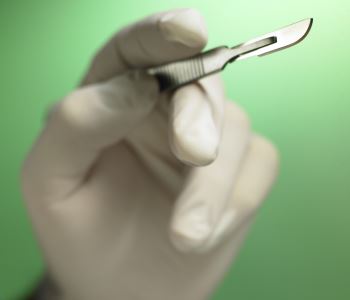Dr. Frederic Mohs, a surgical professor of at the University of Wisconsin, developed a new and more precise method for removal of skin cancer in the 1940s. Initially, a chemical was applied to the skin and layers of tissue were removed and checked under the microscope for the presence of the cancer. The procedure took a number of days to complete. The technique has been improved and refined since that time. Today, it can be completed in a single appointment. Dr. Bock is proud to bring advanced Mohs surgery to Stockton, Lodi, and Elk Grove, CA.
Mohs micrographic surgery is the best technique for removing skin cancers that have a greater chance of recurring. Using this technique we are able to microscopically examine the margins of the excised tissue looking for cancer at the specimen margin. This is done while the patient is still in the office, and if there is residual remaining skin cancer additional tissue can be removed shortly after the initial excision.
Dr. Bock trained with Dr. Fred Mohs in Madison, Wisconsin in the 1970’s. Dr. Mohs’ technician came to California and set up Dr. Bock’s Mohs laboratory. Since 1974 Dr. Bock has performed thousands of microsurgery procedures on patients from the Central Valley and beyond. He is a referral doctor for this procedure for the Veterans Administration Hospitals in Northern California.
Mohs Micrographic Surgery, or MMS, remains the preferred procedure for treating skin cancers with an elevated risk of local recurrence. This includes cancers on the nose and the ears, as well as cancers around the lips, eyes, and ears. It also includes cancers that have recurred after the initial treatment.
Mohs surgery at California Skin & Laser Center - Dr. Gerald Bock

What is Mohs Surgery?
Mohs surgery is a specific surgical procedure used to treat skin cancer and remove as many skin cancer tissues as possible.
During Mohs surgery, thin layers of cancer-containing skin are progressively removed and examined under a microscope until only cancer-free tissue remains.
The surgeon analyzes the skin tissues until no more cancer cells are appearing.
Can the skin cancer re-appear after the treatment?
No procedure’s 100% perfect. Sometimes for various technical reasons, some cancer can remain.
There is always a risk that it could re-appear, but the risk is smaller than any other skin cancer treatment.
Give us a call today to learn more about Mohs surgery.
In MMS, the area of the tumor is injected with local anesthetic, and a disk of tissue, which is thought to contain the entire cancer, is removed. A map is made indicating the position of the specimen on the patient, and identifying marks are placed on the tissue specimen to ensure its proper orientation.
The specimen is then prepared and examined under the microscope. Because of the preparation and orientation of the tissue, it is possible to examine the entire bottom and all the edges of the specimen. If there is no cancer at any of the edges, then one can be relatively confident that the entire tumor has been removed. If there is cancer at one or more of the edges, additional tissue is removed from these areas until the margins appear clear.
This technique is the most reliable approach for completely removing skin cancer. However, it is not foolproof and sometimes recurrences can occur.
Another advantage of MMS is that it is a tissue-sparing technique, allowing the removal of only a small amount of healthy skin. This results in a smaller defect and which may produce a better cosmetic outcome.
Because it is a labor intensive and time-consuming technique, MMS is not routinely performed in all skin cancers, but only in the more difficult ones.
Dr. Bock trained with Dr. Mohs during his residency, and Dr. Mohs’ chief technician initially came to Stockton to supervise the organization of Dr. Bock’s lab.
If you think you might be a candidate for MMS, you can schedule an office visit with Dr. Bock.
What Is Mohs Surgery?

Goodbye cancer. That’s the happy ending. Following Mo’s Micrographic surgery for more than 97% of new skin cancer cases, the procedure usually takes just a few hours too. Meaning you can walk into your doctor’s office with cancer and walk out cancer-free. Most surgery is most often used to treat basal cell and squamous cell carcinomas, the two most common skin cancers. It removes skin with cancer cells layer by layer, while preserving as much surrounding healthy tissue as possible. The precise surgical procedure is ideal for treating skin cancer on your face, neck, or in sensitive areas such as your hands, feet, or genitals. Here’s how the surgery works. The skin around the cancer cell is numbed with an injected anesthetic. You are awake during the entire step-by-step procedure. Any visible raised area of the cancer is removed. First, your surgeon then begins removing layers of skin affected by the cancerous cells.
The area is mapped to determine the margin or border of the cancer. After each layer comes off, your surgeon examines the edges of the removed tissue under a microscope. To check. For cancer cells, if any, are found at the edge or at the base of what has been removed. An additional thin layer of tissue is removed and inspected. The process continues until no cancer cells are seen in the removed tissue. This step-by-step approach allows the surgeon to verify that all cancer cells have been taken out increasing the chances for a successful outcome. The numbers say it works. Most surgery has the highest cure rate of all treatments greater than 99% confidence for basal cell and 97% for squamous cell skin cancers. Healing time varies based upon the size of the tumor. You may leave the office with a simple dressing over the surgical area. The wound sometimes just heals on its own. Other times stitches may be needed. Peace of mind often accompanies the procedure as you’ll be leaving knowing the cancer is gone. Plan on regular follow-ups with your doctor. Though as anyone who has had skin cancer has an increased risk of developing it again.




